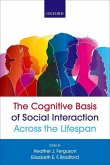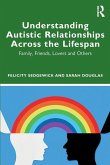The Mathematical Brain Across the Lifespan
Herausgegeben:Cappelletti, Marinella; Fias, Wim
The Mathematical Brain Across the Lifespan
Herausgegeben:Cappelletti, Marinella; Fias, Wim
- Gebundenes Buch
- Merkliste
- Auf die Merkliste
- Bewerten Bewerten
- Teilen
- Produkt teilen
- Produkterinnerung
- Produkterinnerung
The Mathematical Brain Across the Lifespan is the latest volume in the Progress in Brain Research series that focuses on new trends and developments. This established international series examines major areas of basic and clinical research within the neurosciences, as well as popular and emerging subfields.
Andere Kunden interessierten sich auch für
![The Song of the Cell The Song of the Cell]() Siddhartha MukherjeeThe Song of the Cell42,99 €
Siddhartha MukherjeeThe Song of the Cell42,99 €![The Cognitive Basis of Social Interaction Across the Lifespan The Cognitive Basis of Social Interaction Across the Lifespan]() The Cognitive Basis of Social Interaction Across the Lifespan54,99 €
The Cognitive Basis of Social Interaction Across the Lifespan54,99 €![Music and the Aging Brain Music and the Aging Brain]() Music and the Aging Brain113,99 €
Music and the Aging Brain113,99 €![Emotional Development across the Lifespan Emotional Development across the Lifespan]() Linda A. Camras (United States DePaul University)Emotional Development across the Lifespan62,99 €
Linda A. Camras (United States DePaul University)Emotional Development across the Lifespan62,99 €![Bilingualism Across the Lifespan Bilingualism Across the Lifespan]() Bilingualism Across the Lifespan50,99 €
Bilingualism Across the Lifespan50,99 €![Understanding Autistic Relationships Across the Lifespan Understanding Autistic Relationships Across the Lifespan]() Felicity SedgewickUnderstanding Autistic Relationships Across the Lifespan36,99 €
Felicity SedgewickUnderstanding Autistic Relationships Across the Lifespan36,99 €![Language Variation and Language Change Across the Lifespan Language Variation and Language Change Across the Lifespan]() Language Variation and Language Change Across the Lifespan168,99 €
Language Variation and Language Change Across the Lifespan168,99 €-
-
-
The Mathematical Brain Across the Lifespan is the latest volume in the Progress in Brain Research series that focuses on new trends and developments. This established international series examines major areas of basic and clinical research within the neurosciences, as well as popular and emerging subfields.
Produktdetails
- Produktdetails
- Progress in Brain Research Volume 227
- Verlag: Elsevier / Elsevier, München
- Artikelnr. des Verlages: S0079-6123(16)X0004-0
- Englisch
- Abmessung: 22mm x 191mm x 235mm
- Gewicht: 991g
- ISBN-13: 9780444636980
- ISBN-10: 0444636986
- Artikelnr.: 45000769
- Herstellerkennzeichnung Die Herstellerinformationen sind derzeit nicht verfügbar.
- Progress in Brain Research Volume 227
- Verlag: Elsevier / Elsevier, München
- Artikelnr. des Verlages: S0079-6123(16)X0004-0
- Englisch
- Abmessung: 22mm x 191mm x 235mm
- Gewicht: 991g
- ISBN-13: 9780444636980
- ISBN-10: 0444636986
- Artikelnr.: 45000769
- Herstellerkennzeichnung Die Herstellerinformationen sind derzeit nicht verfügbar.
Dr. Fias is a Professor of Experimental Psychology at Ghent University. He is currently editor-in-chief of the Journal of Numerical Cognition and has been consulting editor for Journal of Experimental Psychology: Learning Memory and Cognition and was an editorial board member of the journal Cognition. He serves regularly as an ad hoc reviewer for all major journals in the domain of Cognitive Psychology and Cognitive Neuroscience. Dr. Fias has over 100 publications on the topics of numerical cognition, working memory and cognitive control. His research uses behavioral and neuroimaging techniques in a complementary way.
1. Core mathematical abilities in infants: number and much more
Maria Dolores de Hevia
2. Cognitive and Brain Systems Underlying Early Mathematical Development
David Geary
3. Individual differences in children's mathematics achievement: the roles of symbolic processing and domain-general cognitive functions
Bert De Smedt
4. Foundations of mathematical abilities - towards understanding the neural coding of number in the human brain
Evelyn Eger
5. Similarity interference in learning and retrieving arithmetic facts
Alice De Visscher and Marie-Pascale Noël
6. Neurocomputational foundations of core mathematical abilities
Marco Zorzi
7. The Number Interval Position Effect (NIPE) in the bisection of the mental number line reveals the nonlinear compressed scaling of numerical information: evidence from children, healthy adults and right brain damaged patients
Fabrizio Doricchi
8. Strategic variations with age during arithmetic problem solving: The role of executive control
Patrick Lemaire
9. Evolutionary basis of arithmetical abilities
Brian Butterworth
10. Memory and cognitive control systems and circuits in mathematical cognition and learning
Vinod Menon
11. Brain stimulation and mathematical training: The contribution of core and non-core skills
Chung Yen Looi and Roi Cohen Kadosh
12. What causes dyscalculia? The core number module impairment hypothesis
Manuela Piazza
13. Working memory disruption in developmental dyscalculia
Denes Szucs
14. Ordinality and the Number Symbol System: Evidence from brain and behaviour
Daniel Ansari
15. The relationship between core cognitive abilities and early numeracy
Daniel C. Hyde
Maria Dolores de Hevia
2. Cognitive and Brain Systems Underlying Early Mathematical Development
David Geary
3. Individual differences in children's mathematics achievement: the roles of symbolic processing and domain-general cognitive functions
Bert De Smedt
4. Foundations of mathematical abilities - towards understanding the neural coding of number in the human brain
Evelyn Eger
5. Similarity interference in learning and retrieving arithmetic facts
Alice De Visscher and Marie-Pascale Noël
6. Neurocomputational foundations of core mathematical abilities
Marco Zorzi
7. The Number Interval Position Effect (NIPE) in the bisection of the mental number line reveals the nonlinear compressed scaling of numerical information: evidence from children, healthy adults and right brain damaged patients
Fabrizio Doricchi
8. Strategic variations with age during arithmetic problem solving: The role of executive control
Patrick Lemaire
9. Evolutionary basis of arithmetical abilities
Brian Butterworth
10. Memory and cognitive control systems and circuits in mathematical cognition and learning
Vinod Menon
11. Brain stimulation and mathematical training: The contribution of core and non-core skills
Chung Yen Looi and Roi Cohen Kadosh
12. What causes dyscalculia? The core number module impairment hypothesis
Manuela Piazza
13. Working memory disruption in developmental dyscalculia
Denes Szucs
14. Ordinality and the Number Symbol System: Evidence from brain and behaviour
Daniel Ansari
15. The relationship between core cognitive abilities and early numeracy
Daniel C. Hyde
1. Core mathematical abilities in infants: number and much more
Maria Dolores de Hevia
2. Cognitive and Brain Systems Underlying Early Mathematical Development
David Geary
3. Individual differences in children's mathematics achievement: the roles of symbolic processing and domain-general cognitive functions
Bert De Smedt
4. Foundations of mathematical abilities - towards understanding the neural coding of number in the human brain
Evelyn Eger
5. Similarity interference in learning and retrieving arithmetic facts
Alice De Visscher and Marie-Pascale Noël
6. Neurocomputational foundations of core mathematical abilities
Marco Zorzi
7. The Number Interval Position Effect (NIPE) in the bisection of the mental number line reveals the nonlinear compressed scaling of numerical information: evidence from children, healthy adults and right brain damaged patients
Fabrizio Doricchi
8. Strategic variations with age during arithmetic problem solving: The role of executive control
Patrick Lemaire
9. Evolutionary basis of arithmetical abilities
Brian Butterworth
10. Memory and cognitive control systems and circuits in mathematical cognition and learning
Vinod Menon
11. Brain stimulation and mathematical training: The contribution of core and non-core skills
Chung Yen Looi and Roi Cohen Kadosh
12. What causes dyscalculia? The core number module impairment hypothesis
Manuela Piazza
13. Working memory disruption in developmental dyscalculia
Denes Szucs
14. Ordinality and the Number Symbol System: Evidence from brain and behaviour
Daniel Ansari
15. The relationship between core cognitive abilities and early numeracy
Daniel C. Hyde
Maria Dolores de Hevia
2. Cognitive and Brain Systems Underlying Early Mathematical Development
David Geary
3. Individual differences in children's mathematics achievement: the roles of symbolic processing and domain-general cognitive functions
Bert De Smedt
4. Foundations of mathematical abilities - towards understanding the neural coding of number in the human brain
Evelyn Eger
5. Similarity interference in learning and retrieving arithmetic facts
Alice De Visscher and Marie-Pascale Noël
6. Neurocomputational foundations of core mathematical abilities
Marco Zorzi
7. The Number Interval Position Effect (NIPE) in the bisection of the mental number line reveals the nonlinear compressed scaling of numerical information: evidence from children, healthy adults and right brain damaged patients
Fabrizio Doricchi
8. Strategic variations with age during arithmetic problem solving: The role of executive control
Patrick Lemaire
9. Evolutionary basis of arithmetical abilities
Brian Butterworth
10. Memory and cognitive control systems and circuits in mathematical cognition and learning
Vinod Menon
11. Brain stimulation and mathematical training: The contribution of core and non-core skills
Chung Yen Looi and Roi Cohen Kadosh
12. What causes dyscalculia? The core number module impairment hypothesis
Manuela Piazza
13. Working memory disruption in developmental dyscalculia
Denes Szucs
14. Ordinality and the Number Symbol System: Evidence from brain and behaviour
Daniel Ansari
15. The relationship between core cognitive abilities and early numeracy
Daniel C. Hyde








